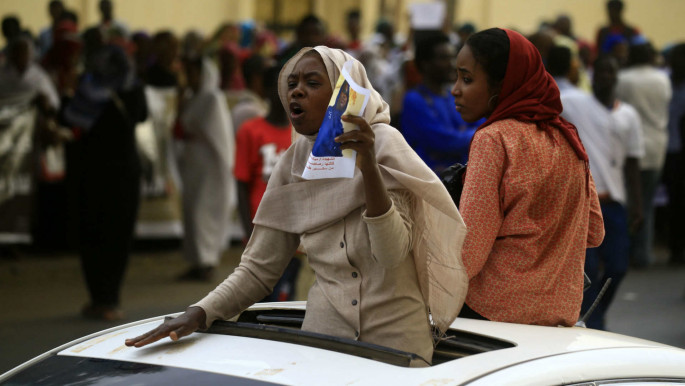Sudan protest leaders demand generals step down, militias disarm as crackdown death toll rises
Sudanese protest leaders dismissed a call Wednesday for talks with the ruling generals, saying the military cannot be serious about negotiations while troops keep shooting and killing protesters.
A spokesman for the protesters said they would instead continue their pro-democracy campaign to pressure the military to hand over power to a civilian authority.
In a statement published on Wednesday, the Forces for Freedom and Change, an umbrella group for the protesters, said that the generals who took over power after the fall of Omar al-Bashir in April have now proven to be an obstacle to any transition to democratic rule, and called for civil disobedience.
The statement also demanded the disarmament of the regime-run militia known as the Rapid Support Force, which has been accused of orchestrating the Monday massacre against protesters.
The death toll in the military's crackdown reached 60 on Wednesday, organizers said. The mounting casualties are the latest challenge to the protest movement, which now aims to show it can keep up pressure in the streets after its central rallying point — the weeks-long sit-in outside the military headquarters in Khartoum — was wiped out on Monday.
In April, the movement succeeded in forcing the military to remove Sudan's longtime strongman, Omar al-Bashir. It then kept its sit-in going, demanding that the generals who took power hand over authority to civilians.
Read more: Sudan protesters mark Eid with funeral prayers after Khartoum massacre
Activists Mohammed Najib and Hashim al-Sudani said there were street battles late Tuesday and early Wednesday in Khartoum's Bahri and Buri districts between protesters and security forces, mainly from the paramilitary Rapid Support Forces, or RSF.
The New Arab Arabic's reporter in Sudan reported casualties, but the regime-enforced internet blackout continues to make it difficult for information to come out of Sudan.
"In Buri, there were lots of shootings and tear gas," al-Sudani said. "They tried to force people into narrow streets" to beat them.
The opposition Congress Party reported more protests on Wednesday, posting footage showing hundreds of people marching in Omdurman.
Since Monday, tensions have remained high in Khartoum and elsewhere as demonstrators staged scattered rallies and blocked main roads with barricades. Security forces have been seen in online videos, patrolling Khartoum districts.
Madani Abbas Madani, a leading activist, said the protesters would continue an open-ended civil disobedience campaign until the overthrow of the ruling military council.
"What happened on Monday was a systematic and planned attempt to impose repression on the Sudanese people," he said.
In a joint statement, the US, Norway and Britain have condemned the security forces' crackdown. The statement, released late Tuesday, said Sudan's military council "put the transition process and peace in Sudan in jeopardy" by ordering attacks on protesters.
 |
|
| Sudanese from various women's groups take part in a march through the streets of the capital [Getty] |
Earlier Wednesday, the head of the military council, Gen. Abdel-Fattah Burhan, said the generals were ready to resume negotiations and that there would be "no restrictions" in talks with the leaders behind the months-long street protests.
"We open our hands to negotiations with all parties ... for the interest of the nation," Burhan said, adding that those responsible for the violent beak-up of the demonstrators' sit-in in the capital, Khartoum, would be held accountable.
The motives for Burhan's about-face — if sincere — were not immediately clear. Burhan had earlier cut the negotiations and canceled all agreed-on points between the military and the Forces for Declaration of Freedom and Change, an alliance which represents the protesters.
Burhan's call for negotiations marked a significant change from his televised speech only a day earlier, when he blamed protest leaders for the volatile situation, accusing them of drawing out negotiations and trying to exclude some "political and security forces" from taking part in any transitional government.
He also announced Tuesday that the military would unilaterally form an interim government and hold elections sooner, within seven to nine months, under international supervision. Protesters had also rejected that because it would put the military in charge of running the election.
Following the military council’s move, Saudi Arabia on Wednesday called for a resumption of dialogue between Sudan's various political forces, expressing concern after a bloody crackdown on protesters.
"The government of Saudi Arabia has followed with great concern the developments in the brotherly Republic of Sudan, which resulted in a number of deaths and injuries," said the statement on the official Saudi Press Agency.
"The kingdom affirms the importance of resuming the dialogue between the various parties in Sudan to fulfil the aspirations of the brotherly Sudanese people."
Read more: Sudan protest leaders reject Saudi, UAE intervention in revolution
Sudan plays a key role in the regional interests of Saudi Arabia and its allies, siding with Riyadh against Shia Iran and providing troops in the Saudi-led coalition fighting in Yemen's war.
Last month, Saudi Arabia announced it deposited $250 million in Sudan's central bank as part of a support package in an apparent lifeline for the military rulers.
In April, Saudi Arabia and the United Arab Emirates announced three billion dollars (2.7 billion euros) in financial aid for Sudan.
Mohammed Yousef al-Mustafa, a spokesman for the Sudanese Professionals Association, which is also part of the alliance and which is leading the demonstrations, said the protesters "totally reject" Burhan's call.
This call is not serious," al-Mustafa told The Associated Press. "Burhan and those under him have killed the Sudanese and are still doing it. Their vehicles patrol the streets, firing at people."
"We will continue in our protests, resistance, strike and total civil disobedience," he added.
![Sudan opposition [Getty] Sudan opposition [Getty]](/sites/default/files/styles/large_16_9/public/media/images/61B0A6D6-C67D-40AC-91C0-285F747B4E9B.jpg?h=d1cb525d&itok=Qgcu1bhB)

![Squad incumbent Summer Lee has won her district's Democratic primary. [Brooke Anderson/The New Arab]](/sites/default/files/styles/image_330x185/public/2024-04/413898031_1041031157158522_8195934720767720634_n%20%283%29.jpg?h=ff8c3fa3&itok=75Sx6fbL)
